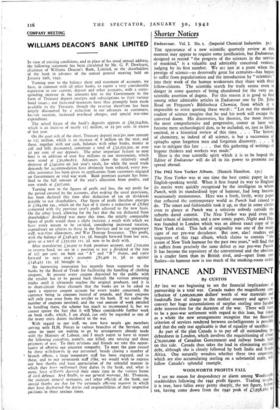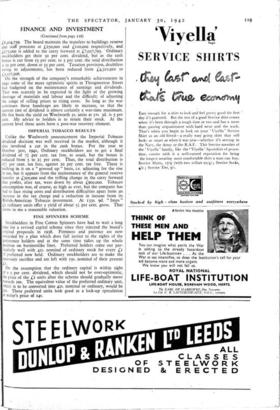FINANCE AND INVESTMENT
By CUSTOS
AT last we are beginning to see the financial implications of partnership in a total war. Canada makes the magnificent con- tribution of r,000,000,000 dollars' worth of war materials and foodstuffs free of charge to the mother country and agrees to convert her huge accumulations of surplus sterling into funded debt interest-free for the duration of the war. There will have to be a .post-war settlement with regard to this loan, but taken as a whole the new arrangements recognise that no financial criterion of services rendered between co-belligerents is possible and that the only test applicable is that of equality of sacrifice. As part of the plan Canada is to pay off all outstanding in- debtedness in London, which involves the requisitioning of about £70,000,000 of Canadian Government and railway bonds held on this side. Canada thus takes the lead in eliminating sterling debt, although she is closely followed by both India and South Africa. One naturally wonders whether these two countries, which are also accumulating sterling on a substantial scale, will follow Canada's splendid example.
WOOLWORTH PROFITS FALL I see no reason for despondency or alarm among Woolworth stockholders following the 1941 profit figures. Trading results. it is true, have fallen away pretty sharply, the net figure, before tax, having come down from the 594o peak of £7,958,160 to
FINANCE AND INVESTMENT
(Continued from page 116)
£6,404,759. The board maintain the transfers to buildings reserve and staff pensions at L250,000 and Li to,000 respectively, and £275,000 is added to the carry forward at £7,057,795. ' Ordinary stockholders get their 5o per cent. dividend, but as the cash bonus is cut from tr5 per cent, to 5 per cent. the total distribution is to per cent. down at 55 per cent. Taxation provision, doubtless owing to adjustments, has been reduced from £4,310,910 to L3,5575206.
On the strength of the company's remarkable achievements in 1940 some of the more optimistic spirits in Throgmorton Street had budgeted on the maintenance of earnings and dividends. That was scarcely to be expected in the light of the growing shortage of materials and labour and the difficulty of adjusting the range of selling prices to rising costs. So long as the war continues these handicaps are likely to increase, so that the current rate of dividend is almost certainly a war-time maximum. On this basis the yield on Woolworth 5s. units at 5 cs 3d. is 5 per cent. My advice to holders is to retain their stock. At the current level these units have a post-war recovery element.
IMPERIAL TOBACCO RESULTS
Unlike the Woolworth announcement the Imperial Tobacco dividend decision was well received in the market, although it also involved a cut in the cash bonus. For the year to October 31st, 1941, Ordinary stockholders are to get a final dividend of 74 per cent. tax free, as usual, but the bonus is reduced from 5 to 24 per cent. Thus, the total distribution is 171 per cent, tax free, against 20 per cent. tax free. There is nothing in it on a " grossed up " basis, i.e. adjusting for the rise in tax, but it appears from the maintenance of the general reserve transfer at k500,000 and the trifling change in the carry forward that profits, after tax, were down by about £goo,000. Tobacco consumption was, of course, as high as ever, but the company has had to face rising costs and distribution difficulties apart from an increase in the tax charge and, a reduction in income from its British-American Tobacco investment. At 133s. gd. " Imps " Li ordinary units offer a yield of about 51 per cent. gross. That seems to me a reasonable valuation.
FINE SPINNERS SCHEME
Stockholders in Pine Cotton Spinners have had to wait a long time for a revised capital scheme since they rejected the board's original proposals in 1938. Firmness and patience are now rewarded by a plan which does full justice to the rights of the preference holders and at the same time tidies up the whole position on businesslike lines. Preferred holders come out par- ticularly well with 42s. nominal of ordinary stock for every £r of preferred now held. Ordinary stockholders are to make the necessary sacrifice and are left with 15s. nominal of their present kr.
On the assumption that the ordinary capital is within sight of a 5 per cent. dividend, which should not be over-optimistic, the price of the ki units after the scheme should gradually move towards tos. The equivalent value of the preferred ordinary unit, which is to be converted into 42s. nominal or ordinary, would be 21s. These preferred units look good as a lock-up speculation at today's price of 14s.



























 Previous page
Previous page